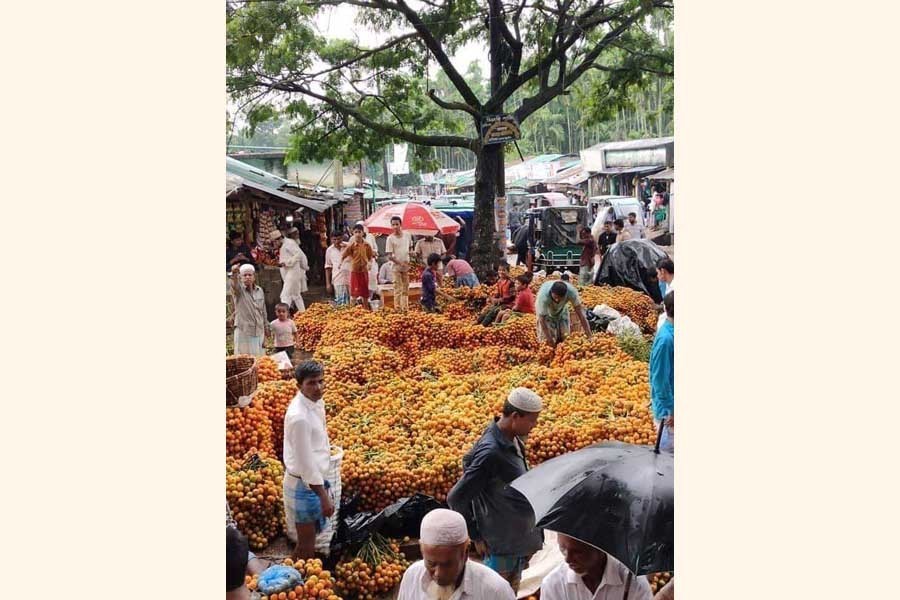COX'S BAZAR: Betel-nut cultivation is increasing in Cox's Bazar as farmers see the return of the heyday for its lucrative market price.
Trade sources say that the nut that is supplementary to betel-leaf preparations now find a good demand at home and abroad, particularly in Middle-Eastern countries, after hard times in the recent past.
More than half a million people in Ukhia, Teknaf, Ramu, Cox's Bazar Sadar Eidgaon, Chakaria, Pekua and Maheshkhali of the sea-beach district make a living by growing betel nuts. According to the farmers, betel-and betel-nut cultivation is more profitable than paddy cultivation these days.
Teknaf's Sabrang, Sadar Teknaf, Bahar Chhara Shamlapur, Ukhia Jaliapalang Union have had bumper crop of betel this time. According to the Department of Agriculture Extension (DAE), "betel-nut yield has been better this season than in other years due to favourable weather and no natural calamities".
Ekhlas Member, a marginal betel farmer in Nidania village of Ukhia, says he has become financially well-off by planting more than 5,000 betel-nut trees on 140 acres of land adjacent to his homestead. His garden has been sold for one million (10 lakh) this season.
Ramu's Lokman Hakim said he sold betel nuts worth Tk 1.2 million (12 lakh) from a betel garden on one acre of land.
Syed Noor, a betel grower from Ramu, said, "This time the betel growers have also benefited. The betel market has not seen a drop in prices throughout the year."
Apart from Kutubdia of the district, betel nut is cultivated more or less in eight other upazilas. Apart from Cox's Bazar, betel is also being cultivated in neighbouring districts, such as Chattogram, and Bandarban, Rangamati and Khagrachari in the Chattogram Hill Tracts. However, nut cultivation is very limited in those areas.
Shamsul Alam Saudagar of Sonarpara village, who is a wholesale trader involved with supply of betel nuts to different parts of the country, said shipments of betel nuts worth crores of taka a week are going to different parts of the country from Sonarpara Bazar, one of the commercial areas of Jaliapalang Union. Thousands of retailers have become self-sufficient by trading in betel nuts. At present these traders are supplying betel to various shops in the city.
Abul Kalam, president of the district Betel Growers' Association, said betel cultivation is now very expensive so many people left the profession. Many have returned to their old jobs after marginal farmers became self-sufficient by selling betel last year and this year. "Many have returned to their old profession".
Abul Bashar, district president of the Betel Nut Traders' Association, said the betel nut of Cox's Bazar is moving out of the country, especially into the Middle East, which has led to higher prices. "Both farmers and traders are benefiting from this."
Nurul Amin Chowdhury, chairman of Jaliapalang union in Ukhia, says every family in his union gets something or other and cultivates betel nut.
Prosenjit Talukder, Upazila Agriculture Officer, said that all kinds of assistance are being provided to the farmers involved in the production of various varieties of curry and vegetables as well as betel nut.
This time in Cox's Bazar, betel has been cultivated in 5,500 hectares of land and betel nut in 4,200 hectares of land, said Md. Ekhlach Uddin, Deputy Director, District Agriculture Extension Department.
He says there have been bumper crops this year in betel nut and betel cultivation. By selling betel nuts, betel growers will earn Tk 8/9 billion (800/900 crore) this year.
"The farmers are happy with the increase in the price of betel nut and betel this year. Betel cultivation is more profitable than paddy cultivation. Farmers are opting for betel cultivation instead of paddy. The result is a day-by-day rise. The numbers of betel nut and betel farmers have multiplied," he added.


